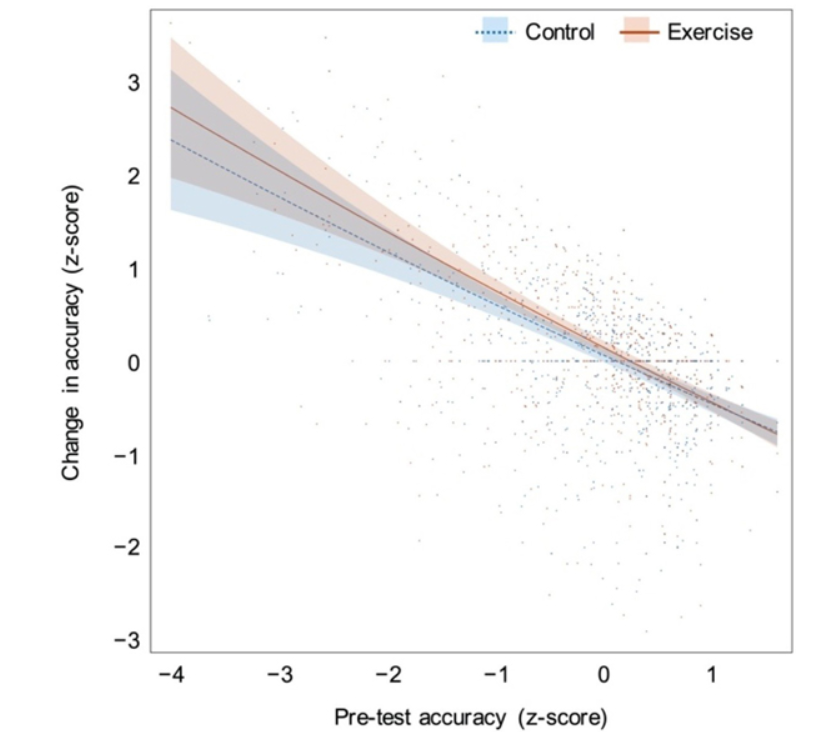教養教育研究院 紙上准教授らの国際共同研究グループが発表 「一過性運動が認知機能に与える効果: なぜ半数の研究が効果を認めていないのか?」
<研究成果のポイント>
- 近年のメタ分析注1)(既存の知見を統合する統計的な手法)により、数十分程度の適度な運動(一過性運動)の後には認知機能が一時的に向上することが示されています。また、この運動のプラスの効果は前頭前野注2)機能に対して大きいことが示唆されています。
- しかしながら、個々の研究を精査すると、約半数の研究が一過性運動のプラスの効果を認めていない現状にあります。
- このような研究間の矛盾を解消することを目的に、「どんな人に効くのか?」、「どんな認知機能に効くのか?」といった視点から、IPDメタ分析注3)を行いました。
- その結果、もともと認知機能が低い人ほど一過性運動のプラスの効果(認知機能の改善度)が大きいことが明らかになりました。
- また、一過性運動の効果は前頭前野機能に対して大きいわけではないことが示されました。
<概要>
過去20年間に渡って、一過性運動が認知機能に与える影響が盛んに研究されてきました。近年、これらの研究のメタ分析注1)が行われており、数十分程度の適度な運動(一過性運動)の後には認知機能が一時的に向上することが示されています。しかしながら、個々の研究を精査すると、約半数の研究が一過性運動のプラスの効果を認めていない現状にあります。
中京大学 教養教育研究院 紙上(かみじょう)敬太 准教授、神戸大学大学院 人間発達環境学研究科 石原暢 助教らの国際共同研究グループは、この矛盾解消に向けて「どんな人に効くのか?」、「どんな認知機能に効くのか?」といった視点から、IPDメタ分析注3)を行いました。その結果、一過性運動が認知機能に与えるプラスの効果は、①もともと認知機能が低い人ほど(もともと認知テストの成績が低いほど)大きいこと(図1)、②前頭前野機能に対して大きいわけではないことが明らかになりました。
 |
| 図1. もともとの認知機能と運動による認知機能改善の大きさの関係 |
縦軸は認知機能の改善の大きさ(認知テストの正答率の変化)、横軸はもともとの認知機能(もともとの認知テストの正答率)を示している。また、赤線は運動条件、青線は運動なしの比較対照条件を示している。運動の効果(赤線と青線の差)が、もともと認知機能が低かった人ほど大きいことがわかる。
これまでの研究の多くで用いられてきた前頭前野機能を評価する認知テストは、難易度が高いものです。本研究結果に基づけば、認知テストの難易度が高かったため、すなわち、もともとの認知テストの成績が低かったため、表面上は、運動のプラスの効果が前頭前野機能に対して大きく見えていたと考えられます。このような認知機能の個人差や認知テストの難易度を考慮していない研究が多く、これが先行研究の矛盾に繋がっていると考えられます。つまり、認知テストの選択・設定が適切であれば、一過性運動のプラスの効果を検出できると見ることができます。
今後の研究では、認知機能の個人差や認知テストの難易度を考慮することにより、研究間の矛盾が解消されることが期待されます。また、これまで注目されてきた前頭前野機能以外の認知機能に注目することにより、本研究分野のさらなる発展が期待されます。
本研究の成果は、2021年6月18日付で「Neuroscience and Biobehavioral Reviews」オンライン版に先行公開されています。
<用語説明>
注1)メタ分析
「分析の分析」を意味し、独立して実施された複数の先行研究の統計量を、統計的な手法で統合する分析。「これまでの研究を統合すると何が言えるのか?」を明らかにする分析方法。
注2)前頭前野
脳の前の方(おでこのすぐ後ろ)にある脳部位。高次な機能を司る脳の司令塔と考えられている。
注3)IPDメタ分析
個人単位データ(individual participant data: IPD)を用いたメタ分析。
<論文情報>
著者名:Toru Ishihara1, Eric S. Drollette2, Sebastian Ludyga3, Charles H. Hillman4, Keita Kamijo5
所 属:1Graduate School of Human Development and Environment, Kobe University、Japan
2Department of Kinesiology, University of North Carolina Greensboro, United States
3Department of Sport, Exercise and Health, University of Basel, Switzerland
4Department of Psychology, Department of Physical Therapy, Movement, & Rehabilitation Sciences, Northeastern University, United States
5Faculty of Liberal Arts and Sciences, Chukyo University, Japan
雑誌名:Neuroscience and Biobehavioral Reviews
DOI:10.1016/j.neubiorev.2021.06.026
公開日:2021年6月18日
Benefits of acute aerobic exercise on cognitive function: Why do 50% of studies find no connection?
Over the past 20 years, many studies have investigated the effects of acute aerobic exercise on cognitive performance. In recent years, meta-analyses*1 of data from these previous research studies have demonstrated that these a single bout of moderate aerobic exercise temporarily improves cognitive performance. However, close examination of the individual research studies on this topic revealed that in approximately 50% of studies, no beneficial link between acute aerobic exercise and cognitive function was found.
An international research collaboration, including Associate Professor KAMIJO Keita (Faculty of Liberal Arts and Sciences, Chukyo University) and Assistant Professor ISHIHARA Toru (Graduate School of Human Development and Environment, Kobe University), conducted an IPD meta-analysis*2 with the aim of resolving these discrepancies. They conducted this analysis from the perspectives of 'What kind of people is this effective for?' and 'Which cognitive functions does it benefit?'
Their results illuminated the following main points regarding the benefits of acute aerobic exercise on cognitive function: 1. The benefits were greater in those who originally had lower cognitive performance (i.e., those with lower scores on the pre-test) (Figure 1). 2. These results show that acute aerobic exercise did not have greater beneficial effects specifically for prefrontal-dependent aspect of cognition but rather more generalized benefits across different types of cognitive performance.
These results were previously published in the online version of Neuroscience and Biobehavioral Reviews on June 18, 2021.
 |
|
Figure 1: The relationship between initial cognitive function |
The x-axis shows the participants' baseline cognitive performance (response accuracy on the pre-test) and the y-axis shows improvement in cognitive performance (i.e. pre-post changes in response accuracy). Red and blue lines show the exercise condition and non-exercise control condition, respectively. It was understood that the benefit of aerobic exercise on cognitive performance (i.e., the difference between the red and blue bands) was greater in those who had lower pre-test scores.
Main points
■Meta-analysis studies conducted in recent years have shown that a single bout of moderate aerobic exercise (acute aerobic exercise) temporarily improves cognitive performance. Furthermore, these analyses have demonstrated that this kind of exercise is disproportionately beneficial to cognitive functions that rely on the prefrontal cortex*3 and associated networks.
■However, upon close examination, around half of these previous studies did not find any beneficial effects of acute aerobic exercise.
■The current research group conducted an IPD meta-analysis with the aim of resolving these discrepancies between the results of previous studies, by focusing on what kind of people benefitted and what kind of cognitive functions were affected.
■They revealed that acute aerobic exercise has a greater beneficial effect in people with lower cognitive performance.
■These findings show that acute aerobic exercise does not have greater beneficial effects specifically on the prefrontal-dependent aspect of cognition but rather more general benefits across different aspects of cognitive performance.
Research Significance
Many of the cognitive tests used in these previous research studies, which assessed the prefrontal-dependent aspect of cognition, have a high difficulty level. Based on the present research results, on the surface, acute aerobic exercise might have had greater benefits on the prefrontal-dependent aspect of cognition if the cognitive tests were difficult, in other words, if participants had a low score on the pre-test. Many studies didn't take into account individual differences in cognitive function and did not alter test difficulty accordingly, and this is thought to be linked to the discrepancies between the results of the different studies. That is, it is possible to detect the benefits of acute aerobic exercise if cognitive tests are appropriately selected and controlled by the researchers.
This IPD meta-analysis revealed that taking into account individual differences in cognitive performance and test difficulty can contribute towards a reduction in discrepancies between research studies on this topic. In addition, most studies so far have focused on the prefrontal-dependent aspect of cognition, however, conducting studies focusing on other types of cognitive function as well will contribute towards the development of this research area.
Glossary
*1 Meta-analysis
A statistical analysis of the results from multiple, independently conducted research studies. It is a method of analysis used to reveal what the combined results of previous research on a particular topic show.
*2 IPD Meta-analysis
A meta-analysis of Individual Participant Data (IPD).
*3 Prefrontal cortex
The front portion of the brain which is located directly behind the forehead. It is thought to be like the brain's command center, governing higher mental functions.
Journal Information
Title
DOI:10.1016/j.neubiorev.2021.06.026
Authors
Toru Ishihara1, Eric S. Drollette2, Sebastian Ludyga3, Charles H. Hillman4, Keita Kamijo5
1. Graduate School of Human Development and Environment, Kobe University, Japan
2. Department of Kinesiology, University of North Carolina Greensboro, United States
3. Department of Sport, Exercise and Health, University of Basel, Switzerland
4. Department of Psychology, Department of Physical Therapy, Movement, & Rehabilitation Sciences, Northeastern University, United States
5. Faculty of Liberal Arts and Sciences, Chukyo University, Japan
Journal
Neuroscience and Biobehavioral Reviews